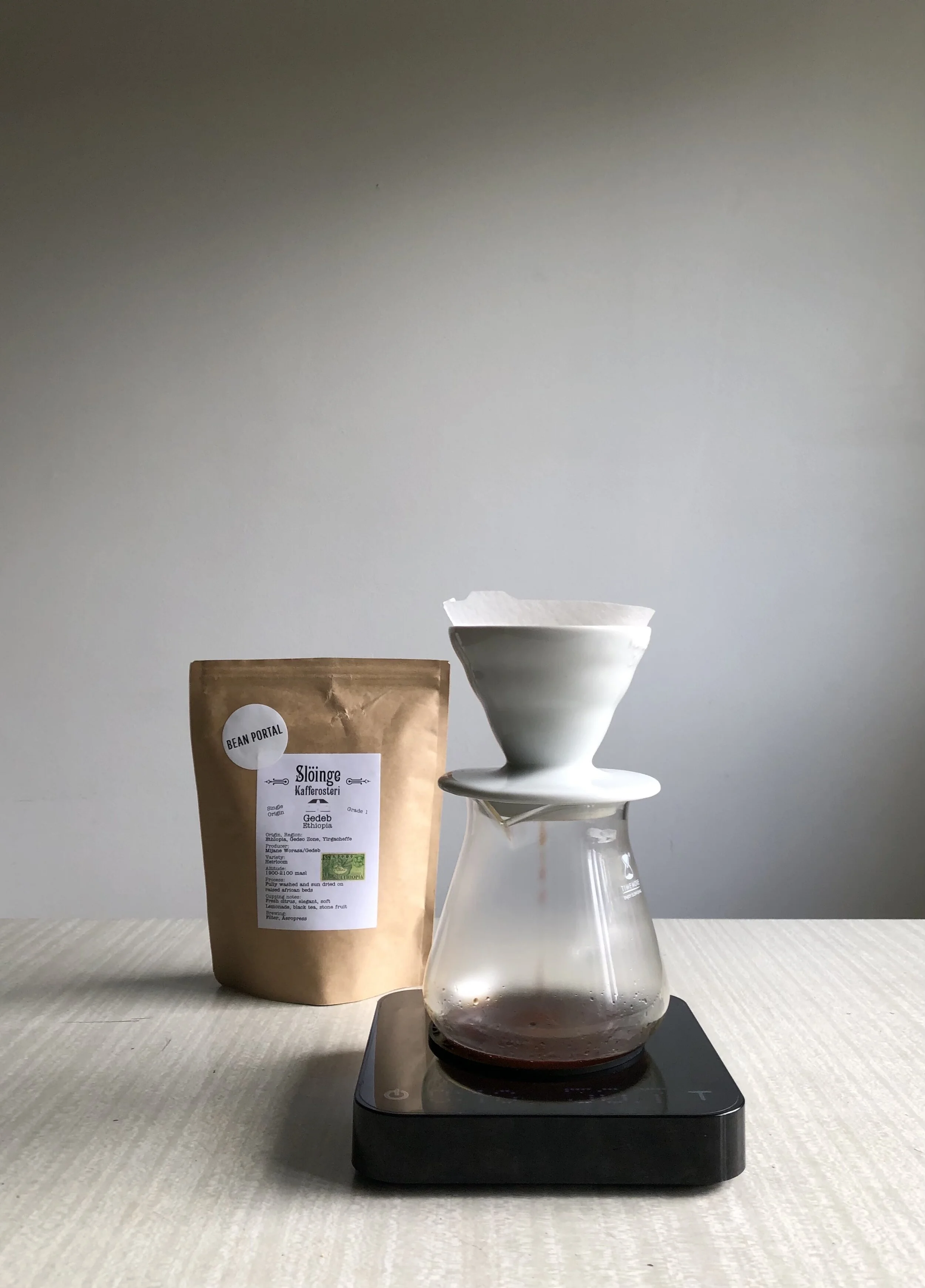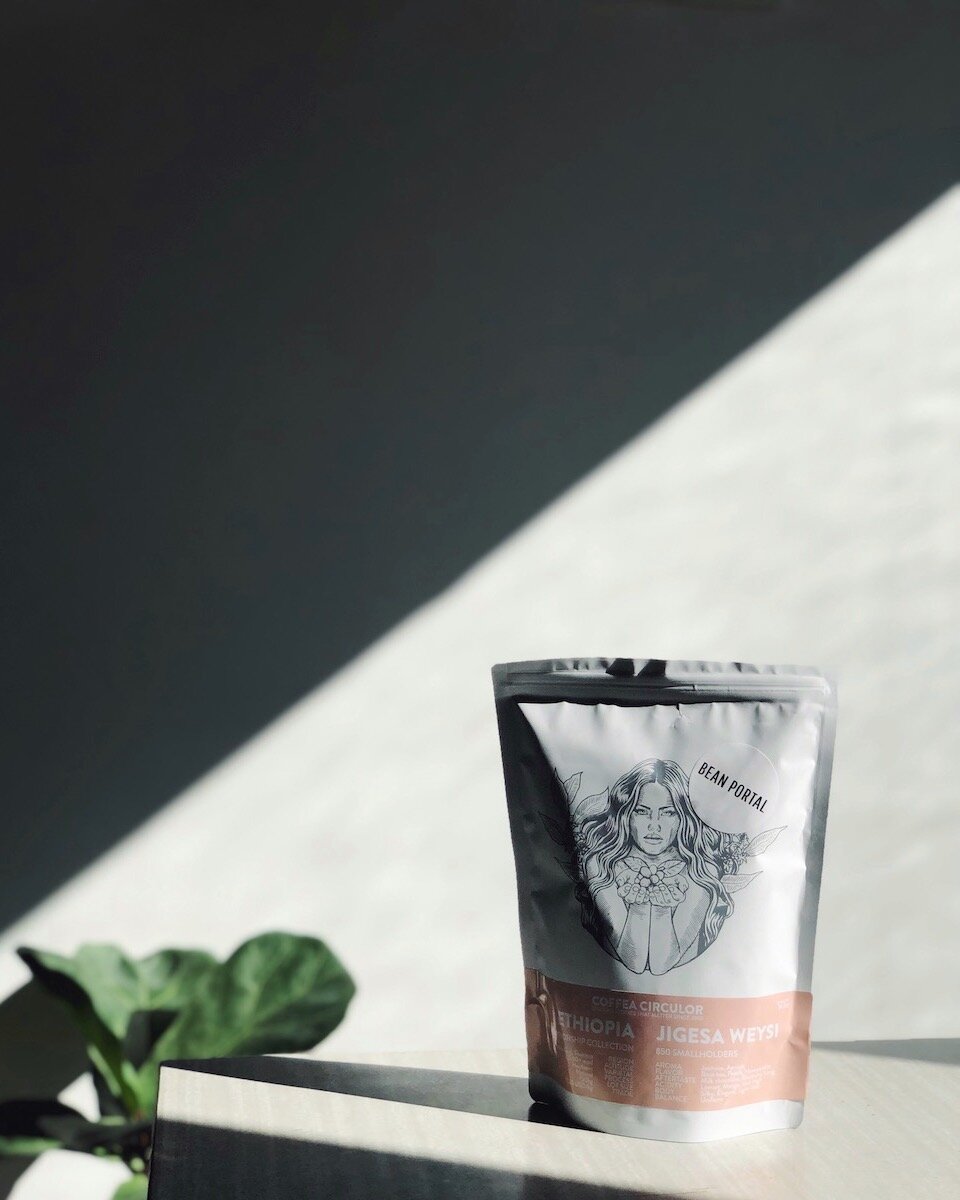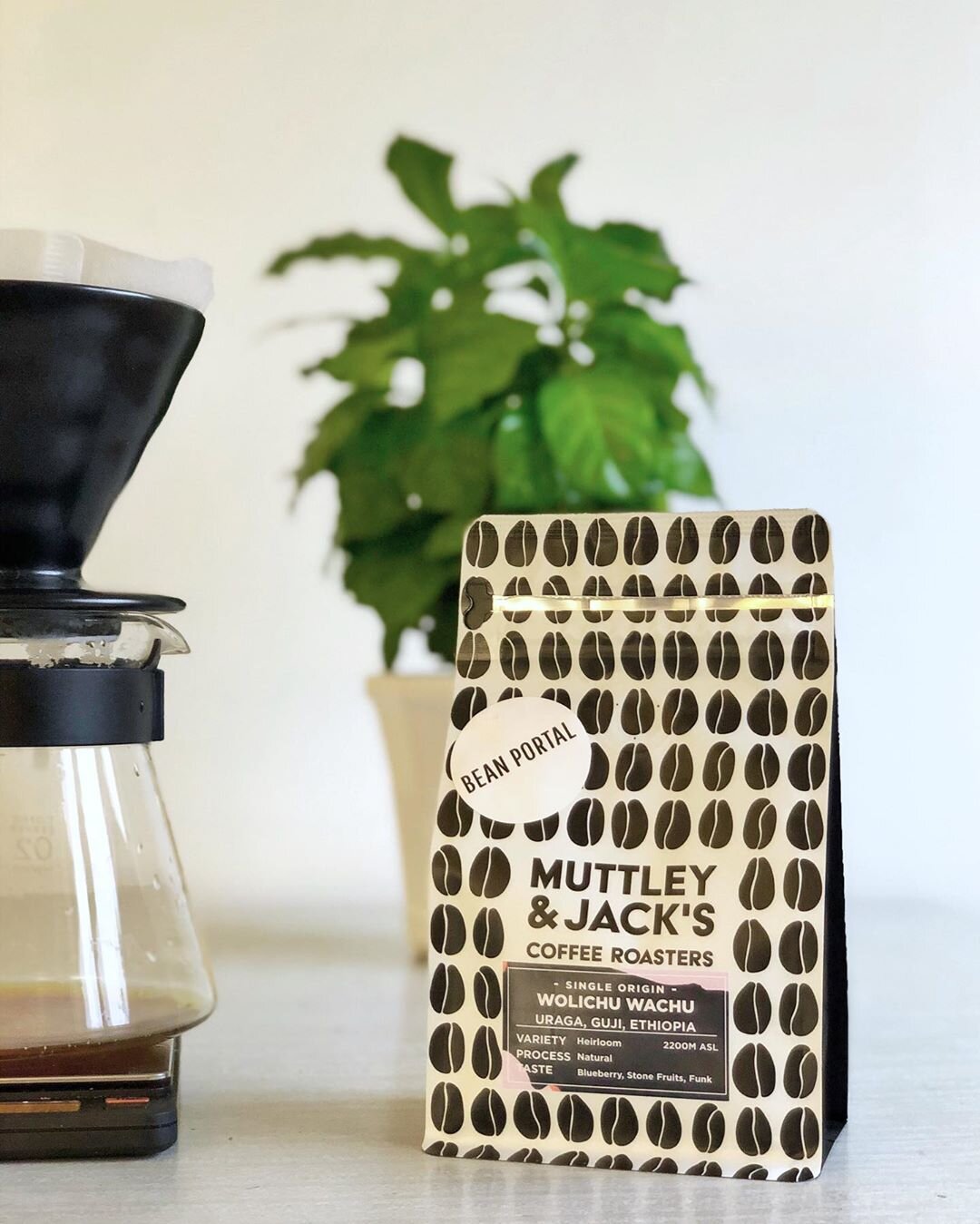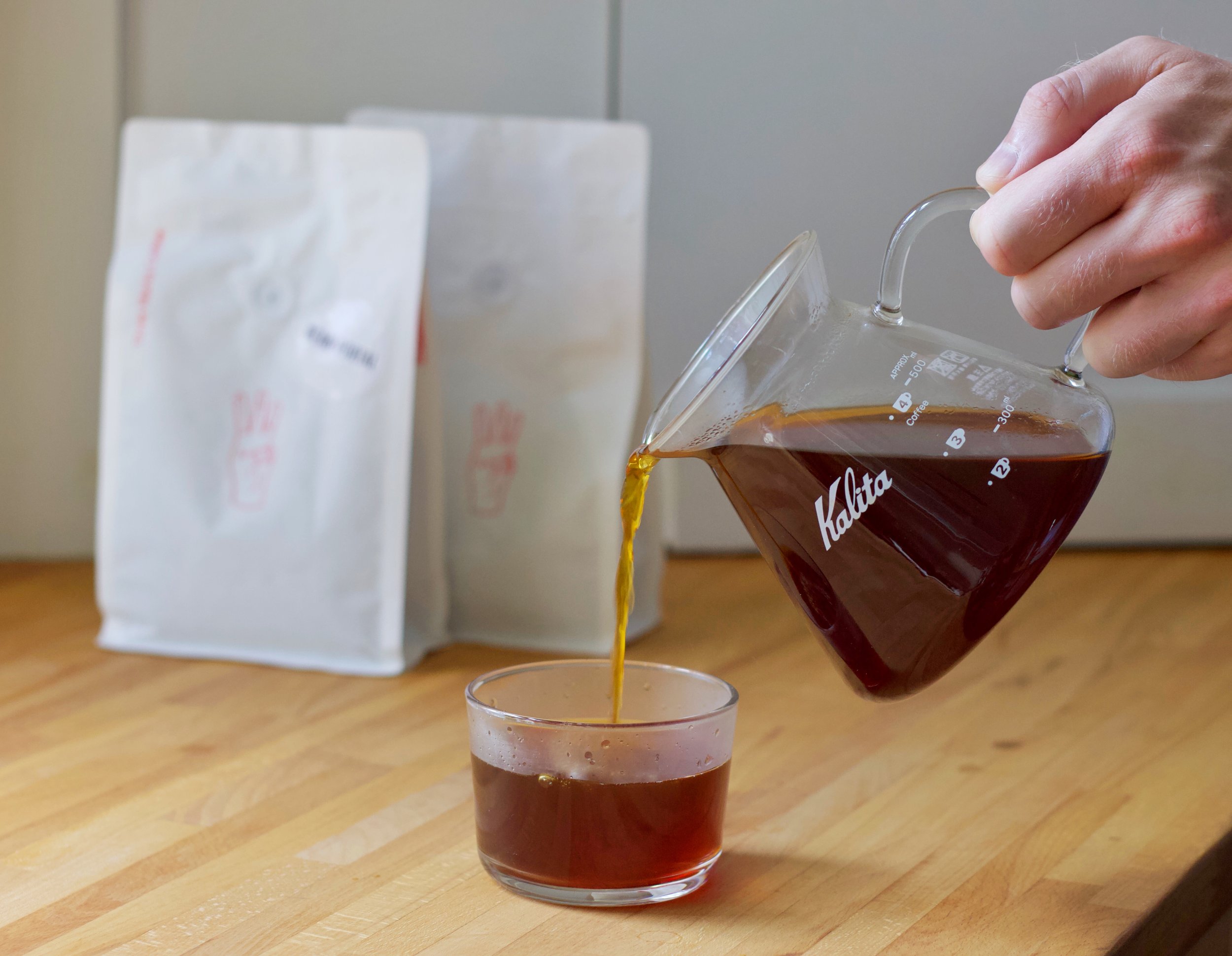Coffea Circulor didn’t start with roasting coffee. How did Coffea Circulor start and evolve to the organization it is today?
Our origin dates back to past work in the United Nations and the environmental branch GRID in Norway situated in the city of Arendal. On our free time during missions to Kenya, the headquarters are located there, we visited coffee farms. We understood producers were paid approximately 0.7 USD/kg for green coffee. This was in late 1990s and early 2000s. Coffee in our part of the world is sold approximately for 10 USD/kg of conventional/supermarket grade. Obviously, something was wrong, it just didn’t add up.
With our friends in Kenya, Coffea Circulor established an open trade platform where everyone could better understand concepts such as Payment for Ecosystem Services (PES). We ensured everyone can better understand the value of the work that goes into producing coffee. We contributed with tools and machinery for enhancing the coffee production. This approach had to seamlessly work where customers - at the other far end of the coffee value chain - could better understand the green bean purchase price relative the roasted/finished product price of the coffee. The trade platform was anchored in the United Nations Sustainable Development Goals (https://www.un.org/sustainabledevelopment/sustainable-development-goals/ and https://www.un.org/millenniumgoals/). Therefore, from an early start the price of the coffee was openly declared and we called it “transparency trade” (http://transparencytrade.org). The first harvest we brought to Norway was acquired for about 7 USD/kg, paid to the farmers at Kiarago Estate in Kenya including milling. This approach was widely accepted on the local market in Norway. This initiative was noticed by the Green Economy-moment within the UN which is also part of what today carries the notation “Circular Economy”.
Throughout the years, Coffea Circulor evolved into a team of coffee professionals who aim to identify emerging issues and respond rapidly in even more countries. Our “comme il faut”-approach, ambition and determination is to analyze the coffee value chain - majorly comprising of cultivation-processing-production-consumption - by using a divide-and-conquer approach (looking closer at all components and actors) rather than brute-force (visualized as “just roasting coffee”). By dissecting and comprehending each phase in each major component, Coffea Circulor can assemble near complete knowledge in order to perfect our craft, increase knowledge and not grow tired of what we do. We believe this is a very potent combination and only then are we able to shape our present and future existence. In opposition, a brute-force approach, to act in “only one phase” is not optimal - at least not for us. If we did - for example “only roasting coffee”, we would likely not exist today simply because “just doing one thing is not enough” - it sustains the status-quo and does not influence any evolution.
Our existence is a crossing of our academic, professional and scientific backgrounds. The response to the word evolution is the result of a commitment to continue to be curious, not accepting the status quo and the determination to constantly advance. To lead and not follow. In consequence, coffee roasting is merely a side effect of our efforts utilizing only 5% of the time spent in total. To successfully start and maintain projects with focus on cultivation, processing and roasting, preparation, feedback etc. constitutes a greater portion of the percentage. Coffea Circulor spends time roasting coffee and we have multiple high-level achievements on national and international level to certify that what we do belongs on a world-class level.
“Specialty coffee” has established frameworks, however they are not complete. What we are doing is filling in the gaps. Coffea Circulor therefore feels “detached” from certain “specialty coffee” branches. This provides a level of freedom and autonomy to develop projects in our own pace based on practical knowledge, funding and relevance. Focus is where we see issues are emerging on an environmental basis, where it is meaningful for us, where it serves a purpose and we feel content. We spent many successful years at national and international coffee events by participating in competitions, coaching and judging. It has a purpose, like a puzzle, where the grand total contributes to updating ones knowledge of the coffee value chain. This combination has led us the following ultimate understanding: Sharing stories that matter by understanding the coffee value chain at an atomic level to build present world class products and services.
With an international team active in Kenya, Norway and Sweden, what’s your focus in each country?
These countries are our core hubs for operations. Some tasks are naturally more convenient to start, execute and maintain depending on location while others are the organic evolution of life situations.
In Kenya, Coffea Circulor Africa Ltd. conducts research (theoretical and practical), processing, knowledge dissemination and exporting.
In Norway, where we have the grand part of the workforce settled, is maintaining ongoing projects related to the local market. This mainly consists of supplying local businesses with selected coffees, addressing environmental issues and spreading knowledge about coffee.
In Sweden, in a new and evolving facility, we are emphasizing on establishing new cultivation, processing projects and developing our ambitions with coffee cherry/cascara we started studying in 2010. Here Coffea Circulor also finishes collections of high performing and high scoring coffees.
On a “world level”, tasks are constantly carried out such as constantly evaluating coffees. Our uncompromising approach singlehandedly sets the bar for re-defining the respect and evaluation of coffee. The process is very labor intensive and time consuming, yet the experience is surpassing the set standards - and a receipt for you as a customer to expect nothing else than the best. In order for something to be “special”, it better be original, unique and memorable. The taste notes are recorded in all categories (Aroma, Flavor, Aftertaste, Acidity, Body and Balance) according to the SCA WBrC scoring sheet. The 3 most common and identified taste notes from each member in the summation of each category are those found on our packaging. Therefore, we do not copy any potential flavor notes provided by importers/exporters/“cuppers”. They are insufficient and irrelevant when roasting for production. We aspire to visualize the spectrum for a dedicated coffee at our level of ambition and expectation anchored in a solid piece of framework.
Coffea Circulor is ensuring the coffees can be well received in all parts of the world depending on the level of expectation, access to water and cultural aspects. For example: with an international team in place, we can for example better cope with water quality in certain areas to optimize the coffee experience. Needless to say, we have conducted an extensive data collection over the last year with almost all private customers where we have provided advice on a personal level and taking this accumulated data to evolve some portions of our brewing and water recommendations.
Additionally, we have team members helping in various countries and keeping us up-to-date with domestic matters regarding the state of coffee, production, logistics, early warning signs, etc.
Coffea Circulor is focused on making an impact. Where do you see Coffea Circulor in 10 years?
We spent 10 years learning and understanding, additional 10 years actively implementing and inspiring. We are now in 2020, conveniently after 20 years in the industry, we have a pre-set roadmap and goals for the upcoming 10 years. These consist of exciting ongoing projects in our pipeline and ardent collaborations to announce.
Throughout this voyage, Coffea Circulor respects suggested frameworks within the “specialty coffee” community where it is fit for purpose. However, we are autonomous and are not following any “waves” or “trends”. We never did follow “waves” and we respected them by learning and understanding their motivation. We set our own standards based on innovation, righteousness and environmental care. We can not exist and act in a “specialty coffee” world that, at the time of this writing in June 2020, is popularized by 3 flavor notes, generating redundant and cross-copied coffee origin-information as standard with the main difference being the coffee packaging.
Our background, ambition, past and present achievements we can justify choices, statements and decisions by being original. Goals chosen are deeply rooted in our own genetics and an idea of “how can Coffea Circulor help” instead of “how can we benefit”. In respect to impact, ambitions and results are not always recognized. In this industry it is easier to be copied rather than promote originality. We believe the people who utterly know what we do, how we do, with who we chose to do, value our choices and results. Additionally, a future that is open for us to roam freely outside of “specialty coffee” and set our own goals - that is very exciting and original.
All of the coffees we sent this month was from your ”Championship Collection”. With a 90+ grading for all three coffees, these are among the highest scoring coffees we’ve ever shipped. Do you think coffee of such quality will be available to the broad mass of people in the future? How can the availability of such coffee grow without negatively impacting the environment?
This is an excellent question and the reply is built in to our DNA. The short answer would be yes - it is fully possible. It is our professional opinion that superior quality can be made available at a broader scale. There is a misconception surrounding this thematic. It is not in the domain if it can be made a reality - it is about commitment. Consumers are equally responsible to understand the underlying mechanics of what it entails to craft quality products. There is an important relation to understand here for consumers: to comprehend the coffee value chain just as much Coffea Circulor aspires to implement it.
When conscious people invest in Coffea Circulor related products, they also invest in the work that has gone into crafting it and especially for our own proprietary developed intellectual property, products and services. For example, if the consumer knows the cost connected to developing a region and scale up to a certain volume with constant quality, that requires substantial amount of R&D, practically translating to time, energy and monetary investment. Unfortunately, the grand population cancel their interest at this point, demanding excellent coffee, extraordinary experiences without understanding the background and their equal responsibility. When this particular observation reaches a tipping point, perhaps judgment and respect will change and ultimately higher scoring coffees can be understood to be appreciated. We also take into account the longevity of the coffee, the R&D-factor and an experience-factor. Developing something new - regardless if it is a new processing protocol, a roasting algorithm, discovering new areas of growing or alike that is possibly unique requires dedicated resources. Coffea Circulor is not settling for cross-copied supplier provided data sheets about the coffee origin - providing 3 flavor notes and calling it “specialty coffee” - made for volume. Quantity is contra-productive in regards to quality, meaning conveniently preferring financial earnings before quality: the “3 flavor defined”-coffees can not compete with proprietary developed, described and produced coffees.
Per definition, coffee scoring above 80 points is considered “specialty coffee” (how good it tastes) and by origin (traceability). Coffea Circulor has added a third criteria - the actual quality and experience when served in the cup as the taste can be reduced during storage, roast, brewing, etc. As green coffee inherently holds unlocked potential, classified at a generic cupping and scoring for example 88, it can be production roasted beyond 90. Subsequently, a 90+ coffee can be degraded to less than 90. Buying an expensive coffee beyond 90 does not mean it will automatically hold 90 when it has left the roasting device or when being prepared. We have created and implemented routines to guarantee quality is sustained by taking rigorous measures to evaluate coffee guided by our international team. We also have coffees that don’t leave our lab before they are mature for release. There is also a reason for why Coffea Circulor does not introduce constantly “new” coffees throughout the seasons: it can take one whole year (one harvest) to understand the cultivation, the process and to optimize the roast, storage, etc. Most of our offerings are based on long term relationships where we implement a closed feedback-loop with producers to ensure it is up to certain standards.
With that in mind, it is embedded in our roadmap for this decade to actively continue to verify non-negative impact on the environment. Additionally, this will also be added as a criteria to our definition for the coffee world that Coffea Circulor is creating - it proves our commitment to set new standards.
Three fantastic coffees were shipped from you in our May’s box, Ethiopian Jigesa Weysi, Kenyan Githiga BP and Ugandan Kwoti. What makes these coffees special to you?
Coffees at this level have to be prepared with at least a certain amount of precision, tools and above all water within specific ranges. However, we should not let everything go oversteer and become difficult. By the end of the day, just looking at coffee, it should add to a relaxing moment in an ever faster revolving world. Therefore, these coffees are prepared/roasted in such as way like others have expressed: “regardless how you brew the coffee, it turns out good”. If you would like to optimize the experience, tailor them towards your preferences whether you are a hobby brewer, a master barista or preparing for a championship, of course you might use specific tools, time and energy to prepare them to suit your liking.
Coffea Circulor doesn’t utilize adjectives such as “fantastic”, “amazing”, etc. to describe coffees. Coffee is expressive, subjective and it has to be treated according to set protocols at this level where auxiliary words to highlight intensity are more relevant. Yet, “fantastic” is an appreciative expression, however due to subjectivity it can be considered superficial.
Ethiopia Jigesa
Ethiopia Jigesa is a testament to annual improvement and endorsing long term relationships with sorting stations at origin. Coffea Circulor has used coffee from the region for 5-6 years and with a closed feedback loop we can communicate to enhance the experience. It is a time consuming process to understand a coffee from one farm/station/region and be able to have an expressful result. Jigesa is highly appreciated, full of flowers, fruits, berries, roasted with attention for its natural sweetness, playful and integrated acidity. For this, we strongly suggest to select water with low mineral content - as we do for all our coffees - where TDS is ranging between 10-50. Our preference is a TDS reading of 10.
Sensory Experience
Aroma: Jasmine, Apricot
Flavor: Rose tea, Peach, Honeysuckle
Aftertaste: Milk chocolate, Blueberry, Long
Acidity: Lemon, Mango, Mid-High
Body: Silky, Elegant, Light-Mid
Balance: Uniform
Kenya Githiga PB
Kenya Githiga PB and the experience is the result of our research in respect to how particular varieties and the trees is impacting the roasting phase. In 2014, Coffea Circulor found that the SL trees are grafted with Ruiru 11 in various regions in Kenya. This is quite common and adds to a salvaging response for the aging SL-trees. That certainly would have an effect on the future yield. As the trees grow, the cherries will develop differently and therefore one can not apply established roasting and storing techniques for hybrid coffees. This particular coffee could be considered a “regular off the shelf”-coffee, however seeing and knowing how and where it is grown with alike trees, the effect it has on the beans - it be turned to something exceptional. Keywords here are therefore mitigation and adaptation with environmental focus. Coffea Circulor suggests to brew with a low mineral water, medium grind size and extraction time targeted to 3 minutes sharp. For more brewing and water recommendations, kindly see our supplied coffee cards or web.
Sensory Experience
Aroma: Black currant, Butter, Cherry
Flavor: Black currant, Rhubarb, Sweet lemon
Aftertaste: Purple plum, Mid
Acidity: Lemon, Juicy, Low-Mid
Body: Smooth, Mid-High
Balance: Uniform
Uganda Kwoti
Uganda Kwoti is the result with support from the Research Council of Norway. Some years ago, the consisting team members then, started looking at areas where coffee was not considered of high quality. Coffea Circulor set a goal to produce excellent quality by utilizing new and minimal processing methodologies. A natural processing protocol was developed and implemented targeted for Kwoti. Looking in a long term perspective, we believe people are becoming more interested in coffee from Uganda as time passes. If we would tell you that the price for developing this coffee, calculated per kilo, it would be approximately 2,500 EUR. The cost for development is not in parity with the particular lot size. On the bag, expressed is the purchase price for the coffee, not the price that goes into developing it. In perspective, 2,500 EUR/kg should have been the number, not 7.5 USD/kg. We strongly believe the major population in the coffee community, regardless consumer or “specialty”, does not understand this fact (the development-factor) and it has to be thoroughly addressed. With this coffee, there is absolutely no financial win, especially not if the major funding is from a governmental organization. Coffea Circulor believes people who truly appreciate something else will also appreciate the effort. Therefore, as stated above, our contribution here is developing a region, mitigating and accommodating for better understanding to produce superior quality. This coffee, and many others alike, have a background, history, heritage, investment in terms of administration and finances that go beyond “only 3 flavor notes on a package”.
Sensory Experience
Aroma: Apricot, Strawberry
Flavor: Apricot, Mango, Strawberry
Aftertaste: Cocoa, Cola, Mid
Acidity: Peach, Malic, Mid
Body: Round, Mid
Balance: Synergetic
Are you ready for your next coffee adventure?


























































